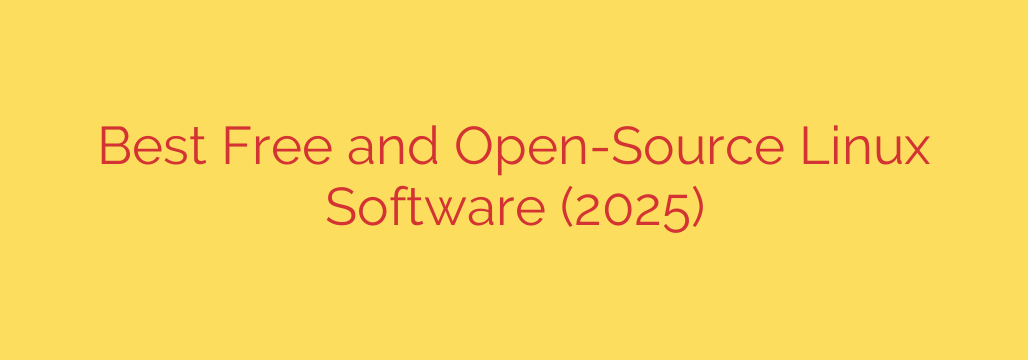
Power Up Your Linux Desktop: The Best Open-Source Apps for 2025
Linux offers unparalleled freedom and control, but its true power is unlocked by the vast ecosystem of high-quality, free, and open-source software. Whether you’re a new user looking for essential tools or a seasoned veteran seeking the latest and greatest, this guide highlights the must-have applications that can transform your Linux experience in 2025.
We’ve curated a list of top-tier software across key categories, focusing on stability, features, and overall performance. These tools prove that you don’t need to spend a dime to achieve professional-grade results.
Productivity and Office Powerhouses
Stay organized and create professional documents, spreadsheets, and presentations with these outstanding office suites.
LibreOffice: The undisputed king of open-source office suites. LibreOffice is a powerful and mature platform that includes everything you need for serious work. It features excellent compatibility with Microsoft Office file formats (.docx, .xlsx, .pptx), making it a seamless replacement for most users. Its components include:
- Writer: A full-featured word processor.
- Calc: A robust spreadsheet application.
- Impress: A versatile tool for creating presentations.
- Draw, Base, and Math: Additional tools for vector diagrams, databases, and formula editing.
OnlyOffice: A modern and sleek alternative with a strong focus on online collaboration and document fidelity. OnlyOffice is known for its flawless rendering of complex Microsoft Office documents, making it a fantastic choice for environments where cross-platform compatibility is critical.
Joplin: For note-taking and organization, Joplin is a secure and private alternative to services like Evernote. It supports markdown, offers end-to-end encryption, and can sync your notes across all your devices using services like Dropbox, Nextcloud, or OneDrive.
The Ultimate Creative Suite, Completely Free
Unleash your creativity with professional-grade tools for graphic design, photo editing, and video production without the costly subscriptions.
GIMP (GNU Image Manipulation Program): Often hailed as the best free alternative to Adobe Photoshop, GIMP is an incredibly powerful tool for everything from photo retouching to complex digital art. While it has a learning curve, its feature set is vast, supporting layers, masks, advanced filters, and a wide range of plugins. It is the go-to choice for serious image manipulation on Linux.
Inkscape: For vector graphics, Inkscape is the open-source equivalent of Adobe Illustrator. It is the perfect tool for creating logos, illustrations, diagrams, and scalable graphics. It uses the standard SVG (Scalable Vector Graphics) file format and offers a comprehensive set of drawing and manipulation tools.
Kdenlive: A surprisingly powerful and user-friendly non-linear video editor. Kdenlive supports multi-track editing, a vast number of audio and video formats, and a wide array of effects and transitions. It strikes an excellent balance between advanced features and ease of use, making it perfect for both beginners and intermediate video creators.
DaVinci Resolve: While not fully open-source, the free version of DaVinci Resolve is a Hollywood-grade video editing, color correction, and audio post-production tool that runs natively on Linux. For serious video work, there is simply no better free option available on any platform.
Blender: An industry-standard, all-in-one 3D creation suite. Blender is used by professionals and hobbyists alike for 3D modeling, animation, visual effects, rendering, and even video editing. Its capabilities are staggering, and its development is more active than ever.
Essential System and Security Utilities
Keep your system running smoothly, efficiently, and securely with these indispensable tools.
Timeshift: This is arguably one of the most important utilities you can install. Timeshift creates incremental snapshots of your system, similar to Windows’ System Restore or macOS’s Time Machine. If a bad update or configuration change breaks your system, you can restore it to a previous working state in minutes.
Stacer: A fantastic all-in-one system optimizer and monitoring tool. Stacer provides a beautiful and intuitive dashboard to manage your system. You can use it to clean temporary files, manage startup applications, uninstall software, and monitor CPU, memory, and disk usage in real-time.
UFW (Uncomplicated Firewall): Most Linux distributions come with a powerful built-in firewall, but managing it through command-line
iptablescan be intimidating. UFW provides a simplified, user-friendly interface to configure your firewall. Enabling a basic firewall is a critical first step in securing your machine. You can enable it with a simple command:sudo ufw enable.
Secure Communication and Web Browsing
Connect with the world safely and privately with these trusted open-source applications.
Firefox: The champion of the open web, Firefox is an excellent default browser for any Linux user. It is fast, feature-rich, and highly customizable. Most importantly, it is developed by the non-profit Mozilla Foundation, which puts a strong emphasis on user privacy and security over corporate profits.
Thunderbird: A powerful and reliable desktop email client, also from Mozilla. Thunderbird makes it easy to manage multiple email accounts, calendars, and contacts in one place. It includes strong privacy features, such as tracker blocking and robust spam filtering.
Actionable Tips for Managing Your Linux Software
To get the most out of your system while maintaining security and stability, follow these best practices:
- Prioritize Official Repositories: Whenever possible, install software from your distribution’s official software center or package manager (like
aptfor Debian/Ubuntu ordnffor Fedora). This is the safest and most stable way to get your applications. - Use Flatpaks for Newer Software: If an application isn’t in your official repositories or you need a newer version, Flatpak (via Flathub) is an excellent choice. Flatpaks are sandboxed, meaning they are isolated from the rest of your system, which enhances security.
- Keep Your System Updated: Regularly run system updates. These updates contain not only new features but also critical security patches that protect you from vulnerabilities. A simple
sudo apt update && sudo apt upgradeon Debian-based systems is all it takes.
Source: https://www.tecmint.com/best-free-open-source-software/








